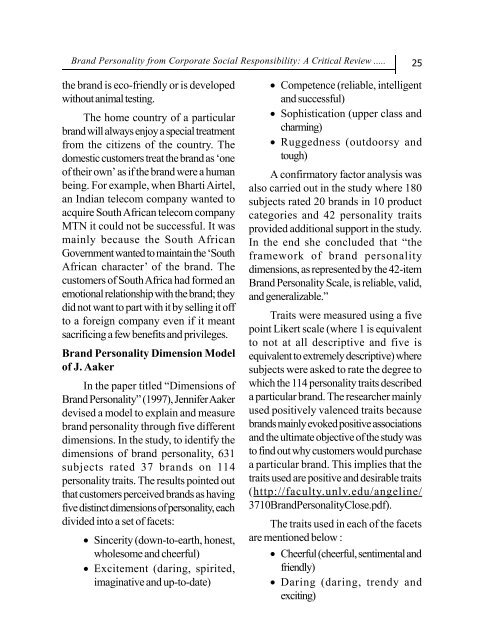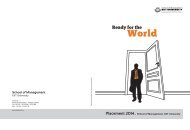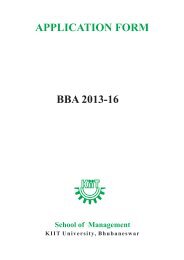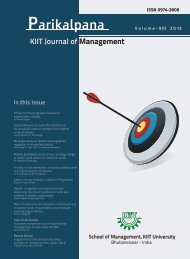Download - School of Management, KIIT University
Download - School of Management, KIIT University
Download - School of Management, KIIT University
You also want an ePaper? Increase the reach of your titles
YUMPU automatically turns print PDFs into web optimized ePapers that Google loves.
Brand Personality from Corporate Social Responsibility: A Critical Review .....<br />
25<br />
the brand is eco-friendly or is developed<br />
without animal testing.<br />
The home country <strong>of</strong> a particular<br />
brand will always enjoy a special treatment<br />
from the citizens <strong>of</strong> the country. The<br />
domestic customers treat the brand as ‘one<br />
<strong>of</strong> their own’ as if the brand were a human<br />
being. For example, when Bharti Airtel,<br />
an Indian telecom company wanted to<br />
acquire South African telecom company<br />
MTN it could not be successful. It was<br />
mainly because the South African<br />
Government wanted to maintain the ‘South<br />
African character’ <strong>of</strong> the brand. The<br />
customers <strong>of</strong> South Africa had formed an<br />
emotional relationship with the brand; they<br />
did not want to part with it by selling it <strong>of</strong>f<br />
to a foreign company even if it meant<br />
sacrificing a few benefits and privileges.<br />
Brand Personality Dimension Model<br />
<strong>of</strong> J. Aaker<br />
In the paper titled “Dimensions <strong>of</strong><br />
Brand Personality” (1997), Jennifer Aaker<br />
devised a model to explain and measure<br />
brand personality through five different<br />
dimensions. In the study, to identify the<br />
dimensions <strong>of</strong> brand personality, 631<br />
subjects rated 37 brands on 114<br />
personality traits. The results pointed out<br />
that customers perceived brands as having<br />
five distinct dimensions <strong>of</strong> personality, each<br />
divided into a set <strong>of</strong> facets:<br />
• Sincerity (down-to-earth, honest,<br />
wholesome and cheerful)<br />
• Excitement (daring, spirited,<br />
imaginative and up-to-date)<br />
• Competence (reliable, intelligent<br />
and successful)<br />
• Sophistication (upper class and<br />
charming)<br />
• Ruggedness (outdoorsy and<br />
tough)<br />
A confirmatory factor analysis was<br />
also carried out in the study where 180<br />
subjects rated 20 brands in 10 product<br />
categories and 42 personality traits<br />
provided additional support in the study.<br />
In the end she concluded that “the<br />
framework <strong>of</strong> brand personality<br />
dimensions, as represented by the 42-item<br />
Brand Personality Scale, is reliable, valid,<br />
and generalizable.”<br />
Traits were measured using a five<br />
point Likert scale (where 1 is equivalent<br />
to not at all descriptive and five is<br />
equivalent to extremely descriptive) where<br />
subjects were asked to rate the degree to<br />
which the 114 personality traits described<br />
a particular brand. The researcher mainly<br />
used positively valenced traits because<br />
brands mainly evoked positive associations<br />
and the ultimate objective <strong>of</strong> the study was<br />
to find out why customers would purchase<br />
a particular brand. This implies that the<br />
traits used are positive and desirable traits<br />
(http://faculty.unlv.edu/angeline/<br />
3710BrandPersonalityClose.pdf).<br />
The traits used in each <strong>of</strong> the facets<br />
are mentioned below :<br />
• Cheerful (cheerful, sentimental and<br />
friendly)<br />
• Daring (daring, trendy and<br />
exciting)







